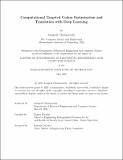Computational Targeted Codon Optimization and Translation with Deep Learning
Author(s)
Chemparathy, Anugrah
DownloadThesis PDF (5.508Mb)
Advisor
Barzilay, Regina
Terms of use
Metadata
Show full item recordAbstract
Codon optimization—the task of recoding a protein’s underlying DNA sequence to maximize expression in a target organism—is a complicated biological optimization problem. Each gene brings a dynamic combination of local and long-range dependencies along with globally imposed constraints specific to the organism. While most existing tools for systematic codon optimization are restricted to optimizing under the constraint of a fixed amino acid sequence, recent architectural advancements in deep learning have made it possible to introduce partial modifications to the amino acid sequence without affecting protein function during the codon optimization process. Such approaches greatly increase the search space of feasible sequences, potentially opening up pathways to previously unconsidered DNA sequences with significantly greater expression rates. In this thesis, we seek to understand and improve the inverse-folding codon optimization model CodonMPNN, the behavior and performance of which have not yet been fully evaluated. We present a detailed empirical evaluation of CodonMPNN, characterizing its performance across reconstruction and translation tasks and demonstrating that it captures higher-order codon usage patterns. We produce evidence that the CodonMPNN’s training has successfully captured nontrivial aspects of the codon distribution for 1000 unique organisms, and are able to better characterize the optimal tasks that CodonMPNN’s non-synonymous nature may be able to solve. Then, by a combination of improved pretraining and a new inference-time evolutionary algorithm we are able to modestly improve the base performance of CodonMPNN from its original publication. Together, these contributions yield a measurable improvement in CodonMPNN’s practical performance and provide actionable guidance for its application in constrained codon design. More broadly, this work highlights the importance of application-aware evaluation when deploying machine learning models in synthetic biology and motivates the design of future architectures that are better aligned with real-world usage constraints.
Date issued
2025-05Department
Massachusetts Institute of Technology. Department of Electrical Engineering and Computer SciencePublisher
Massachusetts Institute of Technology